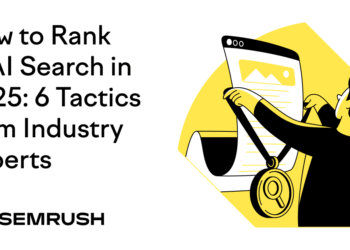Quick Summary
- Local schema markup is a simple way to let search engines know where they can find all your important business details on your website.
- You might need a developer to help you install local schema markup, but it’s a fairly straightforward task and there are plenty of local business schema generator tools to help you do it yourself.
- Semrush Local’s tools complement schema for local business by distributing your details consistently across top directories and helping you track its impact on rankings.
What is local business schema markup?
Local business schema markup is structured data that can be added to websites that make it easier for search engines like Google to find key information.
Search engines can display useful results on local SERPs (search engine results pages), such as knowledge panels, reviews, and Google Maps locations, but finding that information on poorly structured websites is a difficult task for machines that don’t know where to look.
Enter schema, which was developed in 2011 by major search engines Google, Yahoo, Bing, and Yandex to help their crawlers better identify important data. The markup language takes basic text and images on websites and tags it so machines can read them better. Schema markup language descriptions and templates are freely available to website developers and local SEOs on schema.org.
Essentially, schema for local business uses tags to mark up names, addresses, phone numbers, opening hours, and other useful data. Not only does this help search engines find what they’re looking for, but it also improves the chances of local businesses appearing as prominent rich snippets in SERPs.
Getting your local business schema right could mean you’re more likely to appear in Google’s Local Pack (the three businesses displayed under “Places” on Google SERPs) and Google Maps, two coveted positions for local SEO.

SERP for pizza restaurants in Los Angeles
Schema also helps you mark up important pages you want search engines to display as site navigation links that can benefit local users, such as a store locator.

Organic results for a restaurant that could be using local business schema markup to create site navigation links
The fact that marking up your local business data with schema improves the chances of landing more SERP real estate could mean higher click-through rates, more traffic and even improved local rankings. So while search engines do rely on data from Google Business Profiles and other prominent directories to display the best information to users, they also check your website, so it pays to mark up your data properly with local business structured data.
Go further: Semrush Local’s Listing Management tool is the quickest way to distribute business details to top directories and allows you to edit them all in one simple interface, ensuring your listings are consistent with the local business schema markup on your website.
How do you generate and embed local schema markup?
The first step is to identify the best schema local business category so search engines can get a better understanding of what your business does.
The options currently available are:
- AnimalShelter
- ArchiveOrganization
- AutomotiveBusiness
- ChildCare
- Dentist
- DryCleaningOrLaundry
- EmergencyService
- EmploymentAgency
- EntertainmentBusiness
- FinancialService
- FoodEstablishment
- GovernmentOffice
- HealthAndBeautyBusiness
- HomeAndConstructionBusiness
- InternetCafe
- LegalService
- Library
- LodgingBusiness
- MedicalBusiness
- ProfessionalService
- RadioStation
- RealEstateAgent
- RecyclingCenter
- SelfStorage
- ShoppingCenter
- SportsActivityLocation
- Store
- TelevisionStation
- TouristInformationCenter
- TravelAgency
The list covers the most common business types, but if none of the categories are suitable for your business, you can simply mark up your business type as “LocalBusiness”.
Next, you should gather your essential business details to complete the rest of the schema markup. Local business schema works by using identifiers for the important things you want to direct search engines to on your website. The most common identifiers for local business structured data are:
- name
- address
- telephone
- logo
- image (an image you want to be associated with your business. A picture of the front of your premises is a good idea for local businesses).
- @type (this is where you choose the category mentioned previously).
- description
- openingHours
- areaServed
- review (you can highlight good reviews and average star ratings on your website and they may appear on SERPs)
- Url
- sameAs (you can list social media profiles and other pages about your business so search engines know they’re associated with you)
- geo (latitude and longitude coordinates of your location)
- hasMap (link to the Google Maps result)
Here’s an example of a local business’ essential details as regular text.

And here’s the same information displayed as schema markup ready to be embedded on a website.

Fortunately, schema.org website makes it easy for local businesses to find the right schema markup for your situation, so even if you don’t know how to code, it’s pretty easy to fill in your details from a template.
There are also plenty of free tools available that make it really simple to output the markup code, like Google’s Structured Data Markup Helper.

The tool allows you to click relevant areas of your website to populate schema tags, so you don’t even need to type anything out.
But while you can generate your markup with the help of the schema.org website or Google’s local business schema generator, installing it might be a bit trickier for non-techies.
The markup needs to be placed on your website within the HTML source code, but if pasting it in yourself is beyond your technical abilities, you can use a WordPress plugin or a tool like Schema App . Failing that, ask an experienced web developer to do it for you.
What do I do now I’ve added local business schema markup?
Once you’ve finished marking up the local data on your website, you need to check it’s all working as it should be with Google’s Structured Data Testing Tool.
You can also use Google’s Rich Snippets Checker to see if your local business schema is getting the results you’re hoping for.

The bigger picture: Semrush users can easily check which keywords are bringing up rich snippets in Google, with a snapshot of the SERP available for each one.
It’s a good idea to connect your website to Google Search Console so it alerts you to any errors in your local business schema markup, as well as sending other useful notifications that might affect local SEO.
It’s important to keep up to date with changes to schema code to make sure you’ve got the latest markup published on your website. You can stay informed about changes to schema, as well as other Google projects and services, on the search engine’s What’s New page.
On top of making sure your markup is working correctly, you also need to make sure your local schema aligns with your overall local SEO strategy.
Google might get confused if it finds your schema local business category isn’t at all related to the rest of the content on your site, so thorough keyword research and a quality content strategy will go a long way to complementing your markup.
And now that your NAP data (name, address, phone number) is super easy for search engines to find on your website, it needs to be in sync with the details published on your Google Business Profile and other prominent directories like Yelp and Facebook.
Ignoring NAP consistency is likely to negatively impact your local SEO rankings because search engines will quickly determine that your business’ data is unreliable.


















